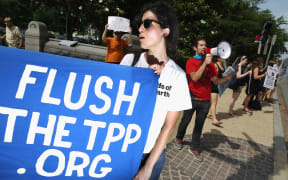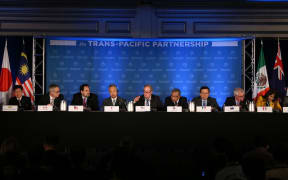When New Zealand began negotiating a free trade deal with Singapore and Chile in 2002, it had a much more ambitious goal in mind.
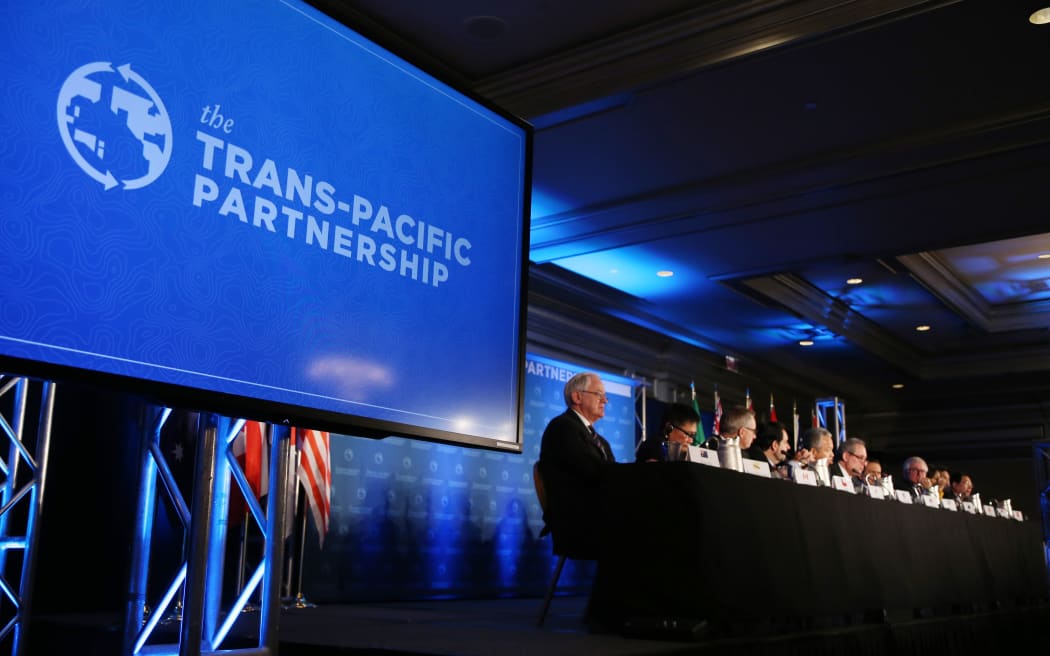
US Trade Representative Michael Froman (6th from left) and delegates from 11 countries at a media conference announcing the agreement. Photo: AFP
Now - 13 years later - it appears that strategy has worked, with trade ministers from 12 countries reaching an agreement on the Trans-Pacific Partnership in Atlanta this week.
The earlier, more modest, negotiation - which became the P4 when Brunei joined in 2005 - was always seen as a stepping stone to a much broader trans-Pacific trade and investment deal.
For New Zealand, it was also a backdoor way to striking an economic agreement with the United States.
The opportunity to do that came in 2008, when the members of the P4 began negotiating to add financial services and investment to the trade deal they had signed in 2005. At that point the United States announced it would participate in the talks.
Phil Goff - the Labour Government's Trade Minister at the time - was quick to phone reporters to alert them to the pending negotiation, before flying to the US for the announcement.
For Mr Goff and trade officials, it was the culmination of years of trade diplomacy to coax the US into the talks.
Once the world's super economy joined, it was only a matter of time before other countries also entered the TPP negotiations.
Australia, Peru and Vietnam were quick to follow suit. Malaysia joined in 2010, Canada and Mexico in 2012 and Japan in 2013.
It is ironic that Labour now looks so suspicious of the agreement struck in Atlanta, given the lengths it went to when last in government to get the talks started in the first place.
Former Labour Prime Minister Helen Clark, now Administrator of the United Nations Development Programme, has said it was important New Zealand be part of the regional trade and investment agreement.
But when Ms Clark was Opposition leader, before becoming Prime Minister in 1999, she was opposed to such trade agreements.
Once in government, her attitude changed.
She explained later that she realised if New Zealand did not engage in these sorts of negotiations, it risked being left isolated as powerful trading blocs were formed.
Establishing a strong Asia-Pacific trading bloc that included the US was seen as essential, particularly as world trade talks floundered.
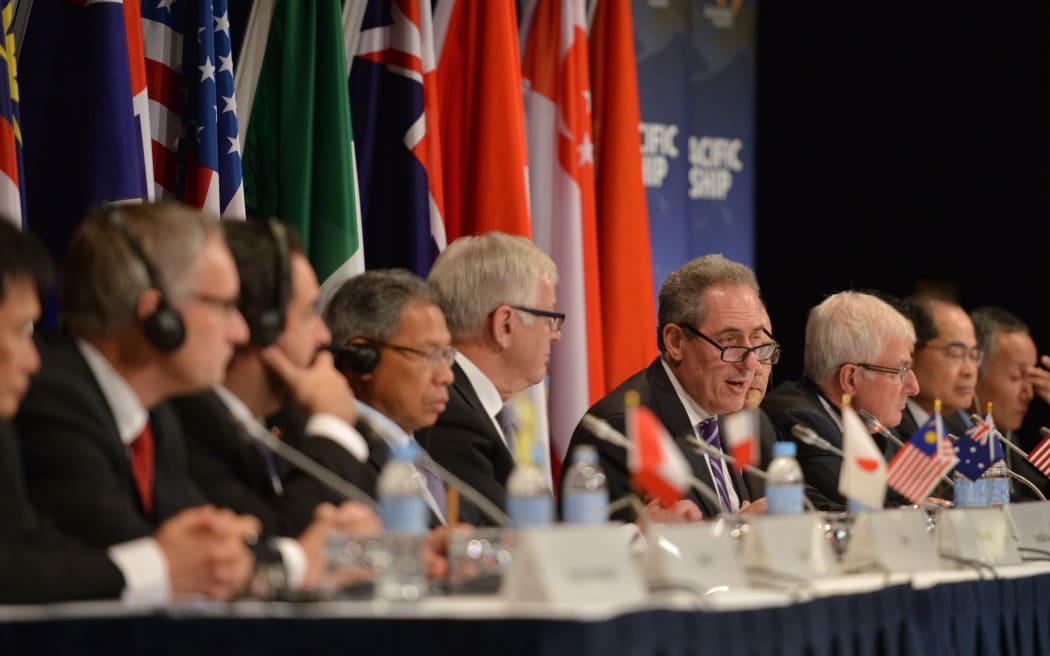
US Trade Representative Mike Froman (C) speaks at a press conference for the Trans-Pacific Partnership (TPP), in Sydney last year. Photo: AFP / FILE
Politically, the TPP negotiations were given greater impetus when US President Barack Obama announced his East Asian pivot.
For President Obama, reaching agreement on the TPP became a crucial part of his strategy to lift the US presence in the Asia-Pacific region.
There had been criticism the US had ignored the region as it focused on the wars in Iraq and Afghanistan, leaving China to fill the economic, military and political vacuum.
The TPP is not an anti-China move, but if the agreement is ratified it will cement the US presence in the region as a counter to China's growing influence.
New Zealand, of course, risks being caught between the competing interests of the US and China.
So far, though, it has managed to tread a careful line between the two heavyweights.
It already has a free trade agreement with China and earlier this year also signed up to the Asia Infrastructure Investment Bank, another Chinese initiative.
But New Zealand has remained close to the US, particularly through its military involvement in Afghanistan and now Iraq, and the TPP agreement will help strengthen the economic relationship.
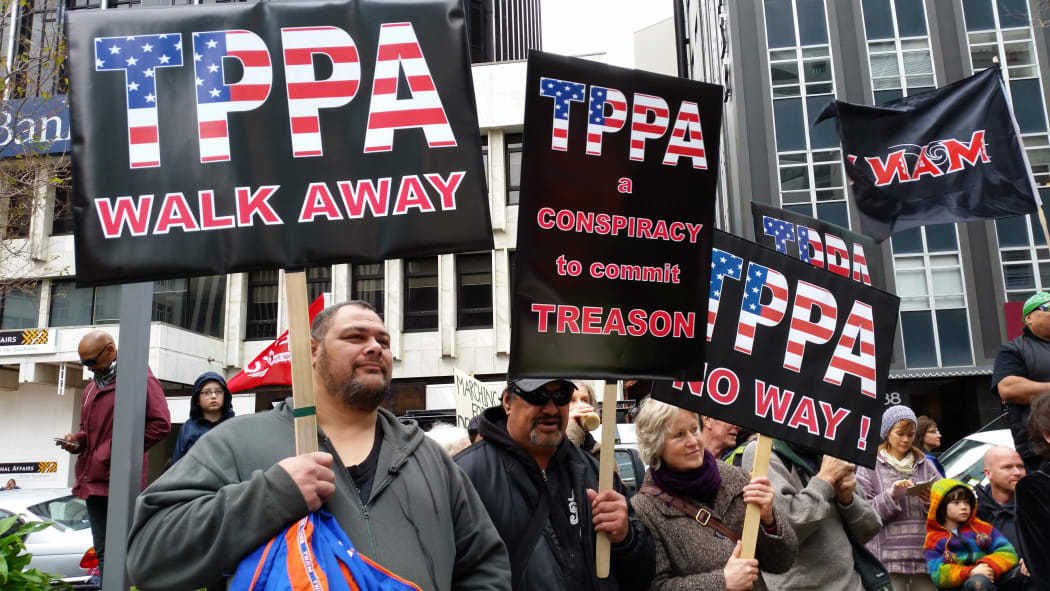
Anti-TPP protesters in Wellington earlier this year Photo: RNZ
Critics, however, remain unimpressed, describing the deal as bad for New Zealand.
From afar Nobel prize winning economist Joseph Stiglitz has said the TPP is not about free trade, but about managed trade which is managed for corporate interests.
But the National-led Government, following the former Labour-led Government's lead, takes the view New Zealand can not afford not to be part of the agreement.
Even if New Zealand does not get all it wants from the TPP, advocates for the deal argued it was better to be part of it than be excluded.
While Labour now questions the agreement, that is the very approach it took during its time in office.
If it were leading the government now it is likely it would have heralded the agreement as not only good for New Zealand, but as a vindication of its trade diplomacy.
